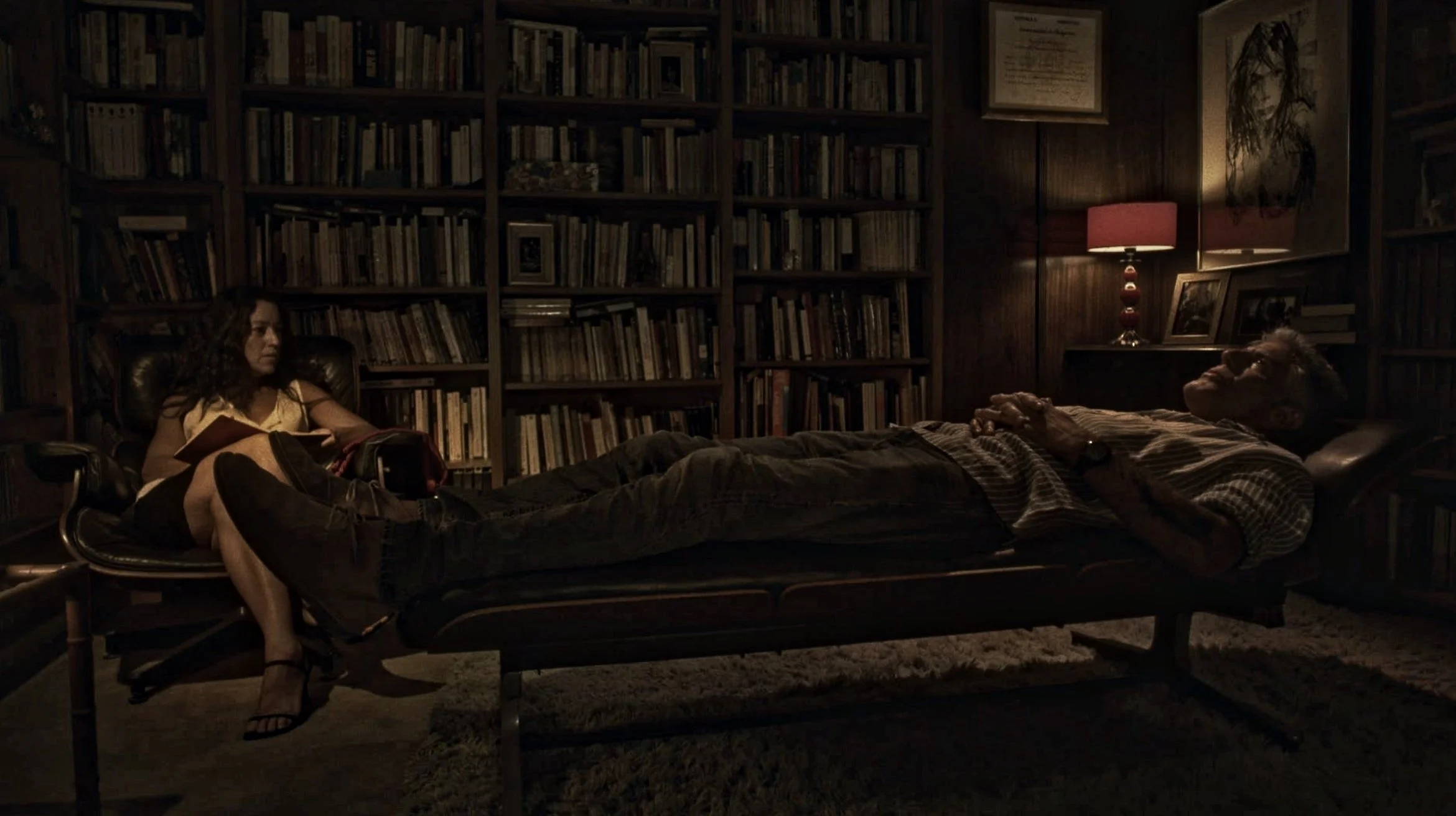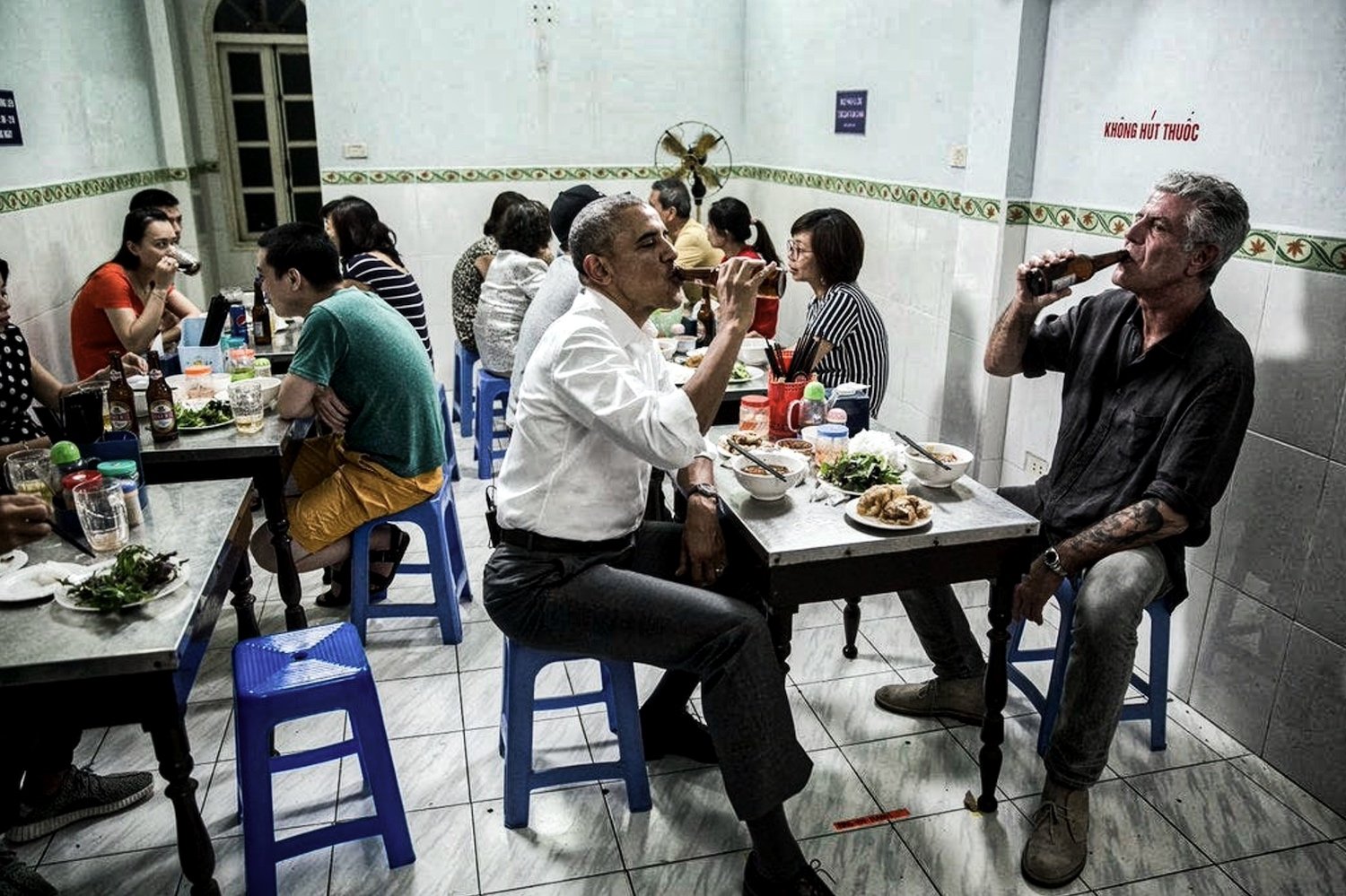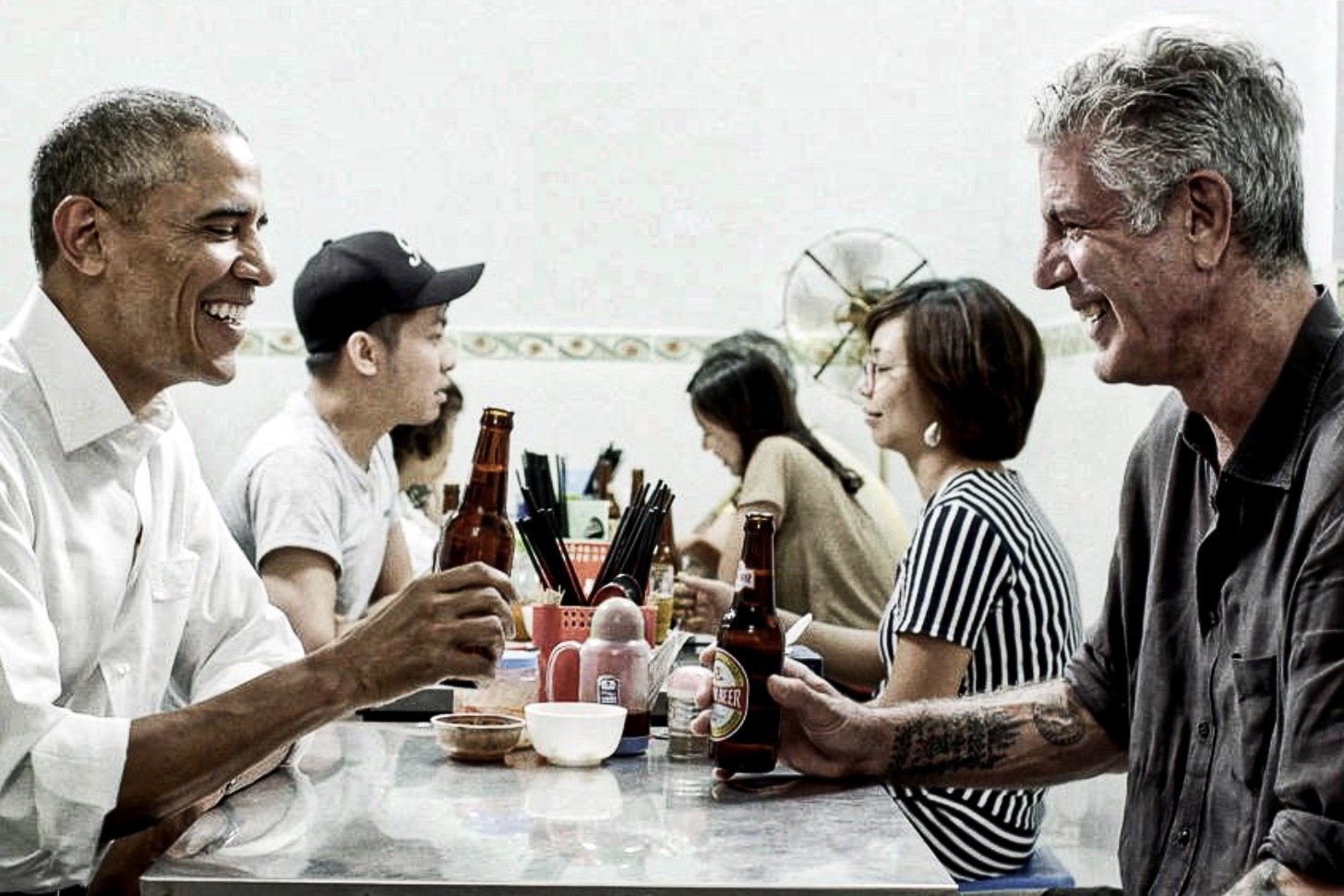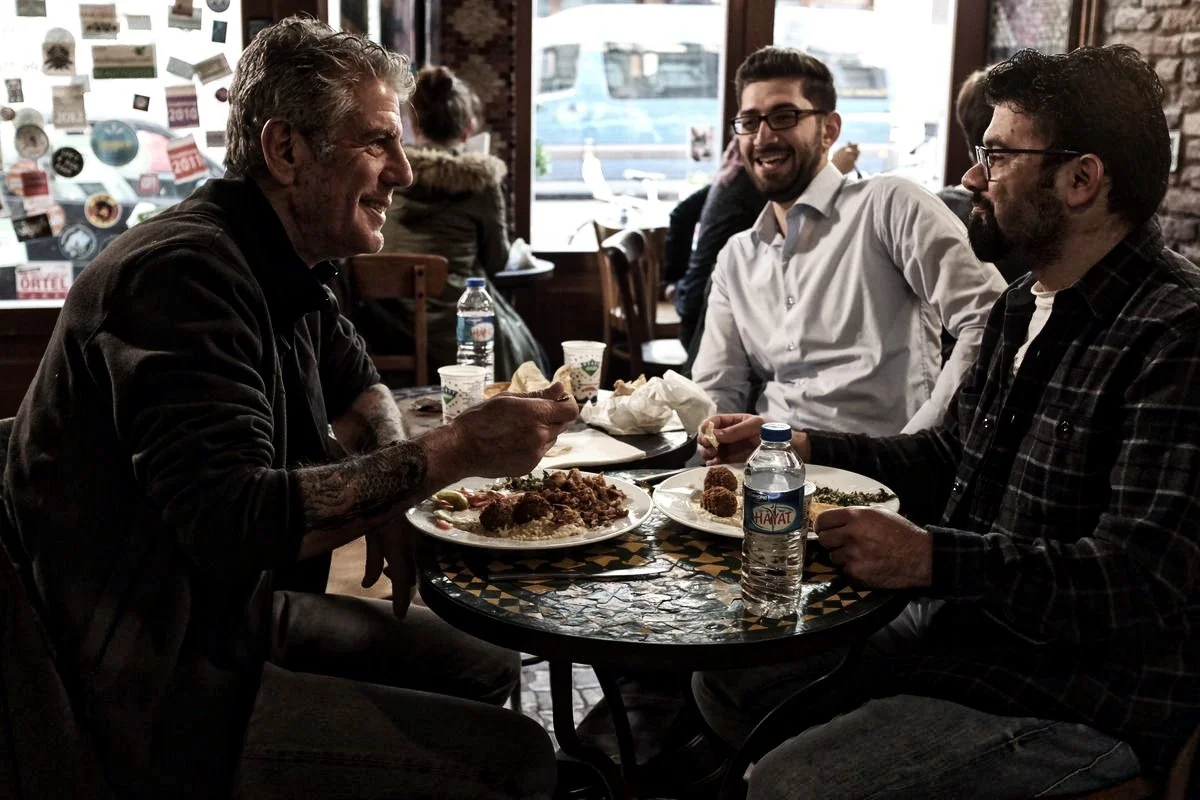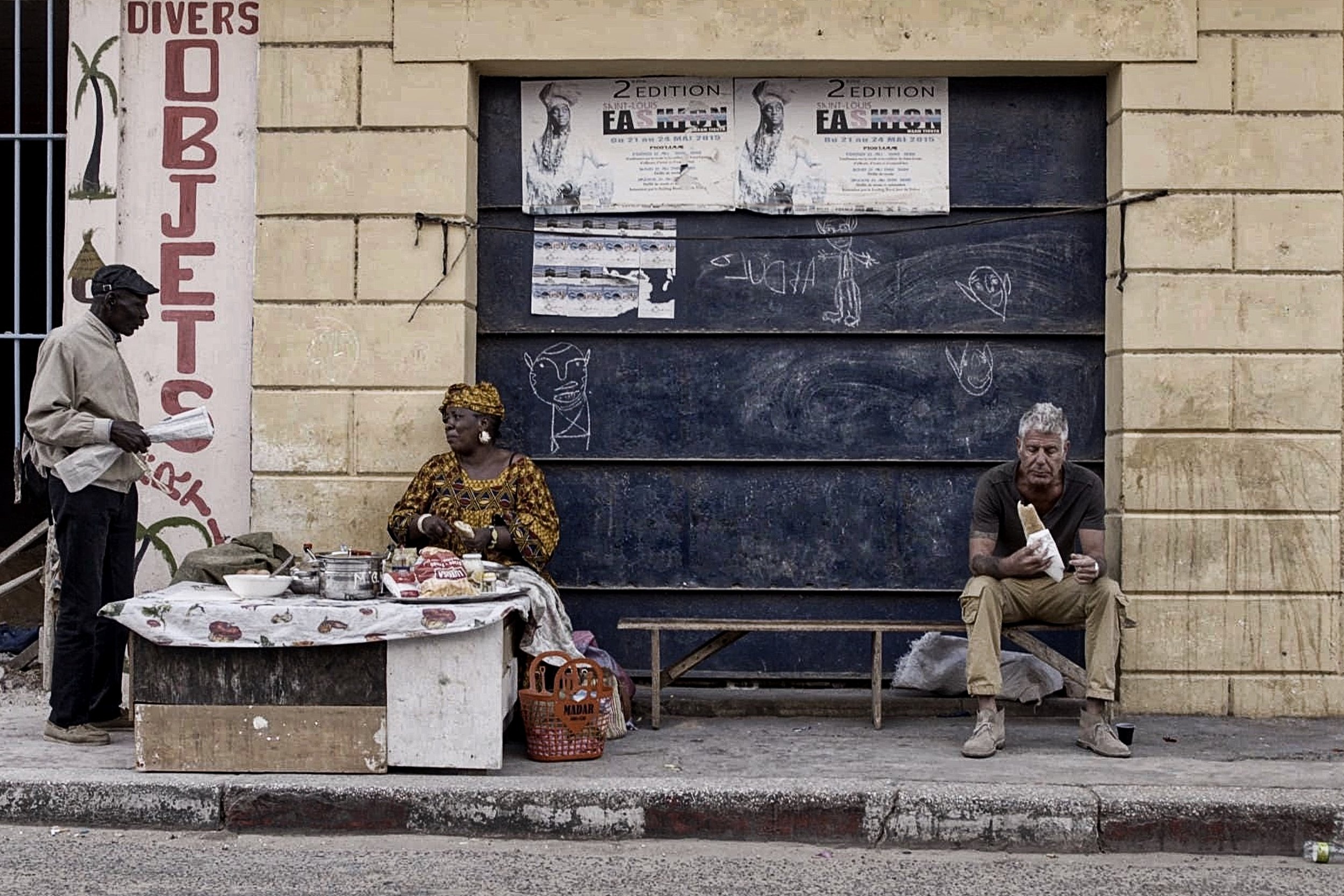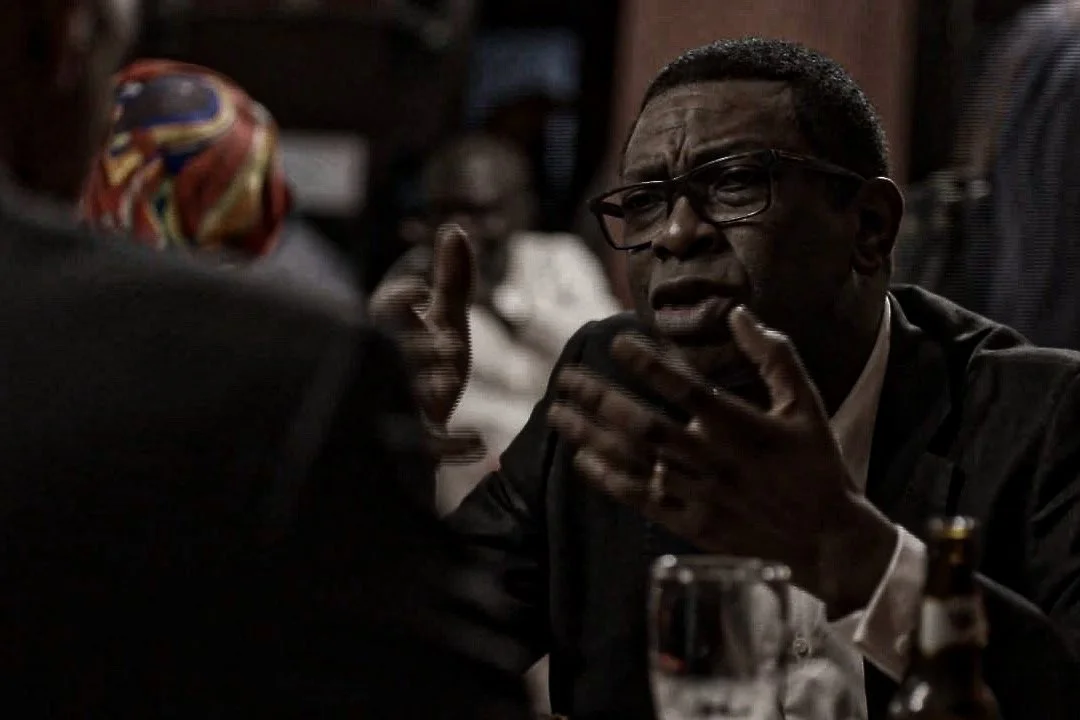“That resistance, that boing! that rubberiness, that elasticity — it’s kind of the last frontier for Western palates.” This was Anthony Bourdain in Chengdu, China, tormenting his friend Éric Ripert, co-owner and executive chef of New York’s Le Bernardin restaurant and famously doubtful about anything hot or spicy, in one of Parts Unknown’s more joyous, life-affirming hours.
Tony Bourdain, as we all know, was not just a solo act. Take, for example, Éric Ripert.
By the time Parts Unknown rolled round to Sichuan in that program’s eighth season, Tony Bourdain had indulged in one of his favourite pastimes — prodding, probing and poking Ripert into a kind of culinary ecstasy, coupled with mortal fear of what Bourdain might do to him next — on seven separate occasions. First, in April 2002, there was The French Laundry Experience in Ripert’s native France, for Bourdain’s nascent program A Cook’s Tour. This was followed in short order by Chicago, Paris and Brooklyn for No Reservations from 2009-‘12, capped by Peru and Marseille in Parts Unknown, in 2013 and ’15 respectively.
“My friend Eric Ripert,” Bourdain wrote on Medium in 2016 (Hot, Hot, Hot!), “maybe you know him from such previous buddy films as Peru or Marseille, had never been to mainland China. Due, perhaps, to his adherence to the teachings of Tibetan Buddhism — and a friendship with Richard Gere — he had concerns about what kind of a welcome he’d receive. For the first few nights he slept with a tinfoil helmet around his head, convinced ‘they’ were onto him every time his cellphone dropped a call. I assured him he was the very last person any Chinese secret service agent would give a shit about, but he was unconvinced. His paranoia was acute.”
In Sichuan, which bowed on CNN in October 2016, Bourdain subjected Ripert to some of the reddest, hottest chilli peppers ever known to humankind. Ripert, famously is about as fond of hot spices as Elvis Presley was of fish. Parfaite! Bourdain must have though to himself. All the better to test, torment and torture Ripert with.
Bourdain’s livelong love affair with life, his joie d’vivre, if you will, his exultation of spirit and general happiness, would be sorely tested by the time Parts Unknown’s eighth season wrapped in December 2016, but for this one moment, with arguably his bestie Ripert — one of them, anyway — he allowed himself to indulge in the joy of conversation, the joy of eating, and the joy of anything he might do.
To this day, Sichuan remains a favourite episode, if not the favourite, of many Bourdainophiles. It’s fast, funny, frenetic, and by the end, given how Bourdain’s life story ended, surprisingly poignant.
Today we Bourdainophiles can watch Sichuan and be happy, a moment’s escape from the vissisitudes of life, and a respite from reflection and regret. Sometimes, as one viewer commented on Reddit at the time, memories good and bad can trick you into believing what you want to believe about the past. Sometimes, one can gain a small measure of solace from how we glorify and romanticize our past lives.
Enough of that shit! Bourdain might interject at this point. Bring on the red hot chilli peppers.
Sichuan is the spiciest, sensualist heartland of all the things Bourdain loved about China, he readily confessed in his voiceover … “food that can burn you down to a charred, smoking little stump.”
For Parts Unknown, that meant dropping in on Dan Dan Tian Shui Mian for some “old traditional Chengdu dishes” — welcome to the weird neurological effect of Sichuan peppers — followed by a trek to Tian Tian Fan Dian, as the site Eat Like Bourdain describes it, “a more intense Sichuan dining experience,” with La zi ji, spicy chicken to you; Mapo tofu, granny tofu to you (ground beef and tofu in a fiery chilli sauce of oil, bean paste, garlic shoots, Sichuan peppercorn, and MSG); and Qing hua jiao yu, green peppercorn fish to you.
Then there was Liang Lukou Hot Pot, for a volcanic broth leavened with fish, tripe, vegetables, tofu, seaweed, and quail eggs, washed down with copious — and we’re talking Bourdain here, so we’re talking truly copious — quantities of Baijiu (a colourless Chinese liquor between 35% and 60% alcohol content) and beer.
To help keep the heat under control, you know.
In case you were wondering — and, seriously now, how could you not — prototypical alcohol making in China dates back to the Neolithic Age, with archaeological discoveries of “alcoholic beverage containers” dating back some 2,000 to 10,000 years BC, aka the latter days of the Stone Age in Europe, Asia, Mesopotamia and Africa. Now you know.
“More comically,” Bourdain continued on Medium, “the level of heat in the Sichuanese specialties he sampled in Chengdu, where we spent most of our time, was, shall we say, rather more than his delicate French palate was used to. Coddled by years of foie gras, runny cheese, flaky pastries, and the subtle notes of many fine wines, the searing burn of dried chilies and the numbing, delightfully disorienting effects of Sichuan peppercorns were a challenge.”
Chengdu, China did impress Ripert on one basic, subconscious level, Ripert admitted early in the program, telling Bourdain: “I’m very surprised already of what I see in the city here. I was expecting, like, a gigantic Chinatown.”
Jeez, an exasperated Bourdain shoots back: “That’s some racist shit, right there.”
Later, Bourdain advises him, “Drinking culture is very important here. If we go to a formal meal, your ability to drink leads to a number of assumptions about you: your general manliness, penis size, your worth as a human being…”
“I’m comfortable with my size,” Ripert assures him.
Hello!
But wait, there’s more wisdom where that came from.
The idea that MSG is bad for you, for example. A myth, Bourdain insists.
“You know what causes Chinese restaurant syndrome?” he tells Ripert. “Racism. ‘Ooh, I have a headache; it must have been the Chinese guy.’”
If you can’t stand the heat … well, you know the rest.
Here’s Bourdain on mapo tofu: “And if you ever have a hangover — and you will, my friend, you will — this will scare the evil right out.”
Sichuan is pure Bourdain, never more evident than in the moment when he regards Ripert struggling manfully with piping hot peppercorn fish.
“Any second now,” he notes dryly, ”that perfect hair is going to burst into flames.”
Touché.
Sichuan may not have been Parts Unknown’s finest hours, but it was one of the funniest.
“Who would you rather see in a Speedo?” he asks Ripert with during one spontaneous tête-à-tête: “Wolf Blitzer, Dr. Sanjay Gupta, or Anderson Cooper?”
Ripert: “Ooh, that’s a tough one.”
Bourdain: “No, actually, there’s an easy answer.”
Supplementary reading:
https://medium.com/parts-unknown/hot-hot-hot-fed7957e65cf
https://www.reddit.com/r/AnthonyBourdain/comments/16gcmo0/bourdain_and_ripert/



